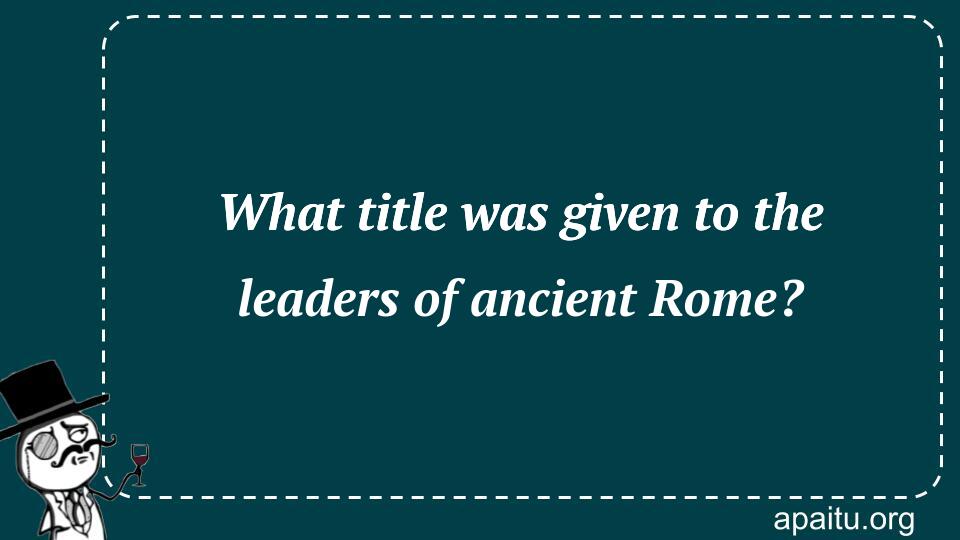Question
Here is the question : WHAT TITLE WAS GIVEN TO THE LEADERS OF ANCIENT ROME?
Option
Here is the option for the question :
- Emperor
- Tsar
- Sultan
- Archduke
The Answer:
And, the answer for the the question is :
Explanation:
Beginning with Augustus, who assumed the position in 27 BCE, the ancient Roman Empire was ruled by a succession of emperors. Tiberius, Caligula, Claudius, Nero, and Romulus Augustulus, the final ruler of the Western Roman Empire in 476 CE, are a few other notable emperors. Julius Caesar never served as an emperor in the traditional sense, but many leaders after him interpreted the name “Caesar” to imply “emperor of Rome,” which is the origin of the terms “kaiser” and “tsar” in Germany and Russia, respectively.

Welcome to the realm of ancient Rome, a civilization that left an indelible mark on the course of history. In the heart of this majestic empire, the leaders held a prestigious title that resonates with power and authority—the Emperor. Join me as we delve into the captivating world of ancient Rome, exploring the significance and role of the Emperor in this mighty civilization.
In ancient Rome, the title of Emperor carried immense weight and held the highest position of leadership. The term “emperor” itself derives from the Latin word “imperator,” meaning “commander” or “general.” Initially, the term “imperator” referred to a victorious military commander, but over time, it evolved to signify the supreme ruler of Rome.
The establishment of the Roman Empire marked a significant shift in the governance of Rome. Prior to the rise of the Emperors, the Roman Republic thrived under elected officials known as consuls and senators. However, as the Republic faced political instability and military challenges, the need for a strong, centralized leadership became evident.
The first Emperor of Rome was Octavian, better known as Augustus, who ascended to power in 27 BCE. Augustus, the adopted son of Julius Caesar, effectively transformed the Roman Republic into an imperial system. He wielded absolute power, serving as both the political and military leader of Rome.
The title of Emperor bestowed upon Augustus and his successors was more than just a name; it represented a significant departure from the republican norms. The Emperors held supreme authority over the Roman Empire, encompassing vast territories and diverse populations. They were not elected officials but rather inherited their positions or seized power through military conquest.
The role of the Emperor extended beyond political leadership. They embodied the embodiment of the state and its institutions. The Emperor was revered as the highest religious authority, serving as the pontifex maximus, or chief priest, of Rome. Religious ceremonies and rituals were intertwined with the Emperor’s public image and persona, fostering a sense of divine connection and legitimacy.
Throughout the centuries, the Roman Emperors left an indelible mark on the empire’s history. Some Emperors were celebrated for their accomplishments, expanding the empire’s borders, implementing reforms, and fostering prosperity. Others, however, faced controversy, political intrigue, and even downfall.
The Roman Empire spanned several centuries, witnessing the rise and fall of numerous Emperors. Each Emperor brought their own unique style and approach to leadership, leaving a distinct imprint on the empire’s trajectory. From the enlightened rule of Marcus Aurelius to the extravagant excesses of Nero, the Emperors shaped the destiny of Rome and influenced the course of Western civilization.
The title of Emperor in ancient Rome conjures images of grandeur, power, and authority. It represents a pivotal era in human history, where a single individual held dominion over one of the world’s greatest empires. The Emperors left a lasting legacy, not only through their political and military achievements but also through their impact on art, architecture, law, and governance.
the leaders of ancient Rome held the prestigious title of Emperor, symbolizing supreme authority and command over the empire. The Emperors were more than mere rulers; they represented the embodiment of Rome’s political, military, and religious institutions. Their reigns shaped the destiny of Rome and left an indelible mark on the annals of history. The legacy of the Emperors continues to fascinate and inspire us, shedding light on the complexities of power and leadership in ancient civilizations.